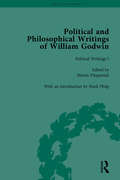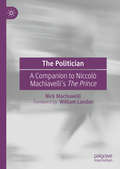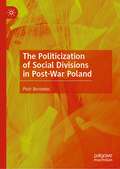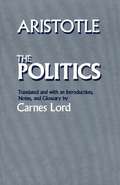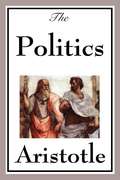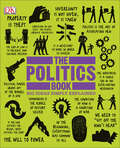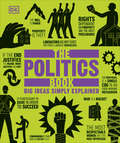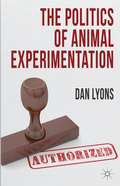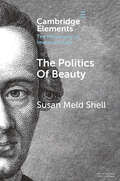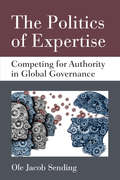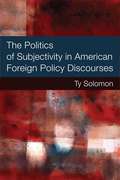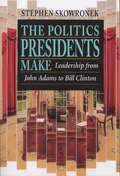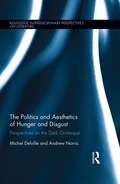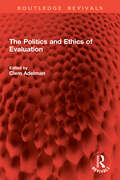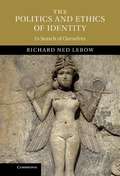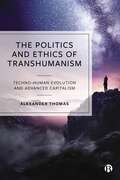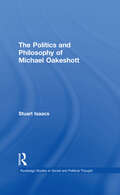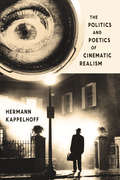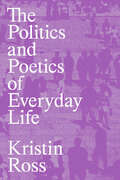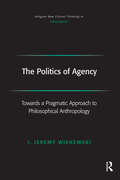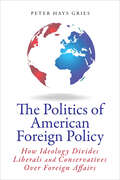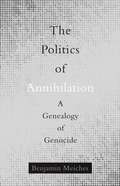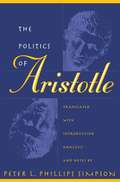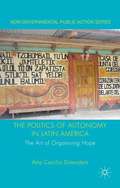- Table View
- List View
The Political and Philosophical Writings of William Godwin vol 1
by Martin Fitzpatrick Mark Philp Pamela Clemit William St.ClairContains all the major political, philosophical and educational writings of William Godwin, one of the foremost philosophers of his age. His work on government and individual freedom, "Political Justice", made him the chief exponent of English radicalism in the latter half of the 18th century.
The Politician: A Companion to Niccolò Machiavelli’s The Prince
by Nick MachiavelliThe age of princes has passed, but the age of politicians is at its heights. So is Niccolò Machiavelli’s The Prince any less relevant? No. But it needs an update, to reflect the political realities of our times. That is the purpose of this groundbreaking manuscript—a guide to success in contemporary politics, where the democratically-elected politician has assumed the role of the classical prince. Here is revealed how a politician must act if she wants to be successful, how she must plot her every move, whether dealing with colleagues, constituents, family members, bureaucrats, lobbyists or the media. Indeed, this manuscript is unique, for it exposes at a level of detail never seen before the inner workings of the mind of the contemporary politician. And while it may prove an asset to aspiring politicians, its frank and honest nature will no doubt strike fear in the hearts of incumbent politicians as it sheds light on their motives, intentions, and aspirations.
The Politicization of Social Divisions in Post-War Poland
by Piotr BorowiecThe monograph examines the sources of Polish social divisions. It explains their emergence and discusses the mechanisms behind their evolution from 1945-2022. The findings corroborate the idea that divisions were formed irrespective of the current state of social hierarchy, or the accepted interpretation of justice, and that they existed both in totalitarian and democratic systems alike. The book distinguishes the category of divisions from the practices of repartition, and demonstrates that the repartitions discussed in a political discourse do not generate divisions, but constitute the politicization of the latter. Repartitions are understood as discursive, dichotomic juxtapositions that result from the existence of divisions and can be used as political tools. It has been demonstrated that they can also function as analytical categories used with a view to determining the state of social inequalities. The notions of divisions and repartitions discussed in this volume confirm the existence of the continuity of changes and describe the evolution of Polish society has a consequence.
The Politics
by AristotleEvery state is a community of some kind, and every community is established with a view to some good; for mankind always acts in order to obtain that which they think good. But, if all communities aim at some good, the state or political community, which is the highest of all, and which embraces all the rest, aims at good in a greater degree than any other, and at the highest good.
The Politics Book: Big Ideas Simply Explained (DK Big Ideas)
by DKLearn about how the world of government and power works in The Politics Book.Part of the fascinating Big Ideas series, this book tackles tricky topics and themes in a simple and easy to follow format. Learn about Politics in this overview guide to the subject, great for novices looking to find out more and experts wishing to refresh their knowledge alike! The Politics Book brings a fresh and vibrant take on the topic through eye-catching graphics and diagrams to immerse yourself in. This captivating book will broaden your understanding of Politics, with:- More than 100 groundbreaking ideas in the history of political thought- Packed with facts, charts, timelines and graphs to help explain core concepts- A visual approach to big subjects with striking illustrations and graphics throughout- Easy to follow text makes topics accessible for people at any level of understandingThe Politics Book is a captivating introduction to the world's greatest thinkers and their political big ideas that continue to shape our lives today, aimed at adults with an interest in the subject and students wanting to gain more of an overview. Delve into the development of long-running themes, like attitudes to democracy and violence, developed by thinkers from Confucius in ancient China to Mahatma Gandhi in 20th-century India, all through exciting text and bold graphics.Your Politics Questions, Simply ExplainedThis engaging overview explores the big political ideas such as capitalism, communism, and fascism, exploring their beginnings and social contexts - and the political thinkers who have made significant contributions. If you thought it was difficult to learn about governing bodies and affairs, The Politics Book presents key information in a clear layout. Learn about the ideas of ancient and medieval philosophers and statesmen, as well as the key personalities of the 16th to the 21st centuries that have shaped political thinking, policy, and statecraft.The Big Ideas SeriesWith millions of copies sold worldwide, The Politics Book is part of the award-winning Big Ideas series from DK. The series uses striking graphics along with engaging writing, making big topics easy to understand.
The Politics Book: Big Ideas Simply Explained (DK Big Ideas)
by DKLearn about how the world of government and power works in The Politics Book.Part of the fascinating Big Ideas series, this book tackles tricky topics and themes in a simple and easy to follow format. Learn about Politics in this overview guide to the subject, great for novices looking to find out more and experts wishing to refresh their knowledge alike! The Politics Book brings a fresh and vibrant take on the topic through eye-catching graphics and diagrams to immerse yourself in. This captivating book will broaden your understanding of Politics, with:- More than 100 groundbreaking ideas in the history of political thought- Packed with facts, charts, timelines and graphs to help explain core concepts- A visual approach to big subjects with striking illustrations and graphics throughout- Easy to follow text makes topics accessible for people at any level of understandingThe Politics Book is a captivating introduction to the world's greatest thinkers and their political big ideas that continue to shape our lives today, aimed at adults with an interest in the subject and students wanting to gain more of an overview. Delve into the development of long-running themes, like attitudes to democracy and violence, developed by thinkers from Confucius in ancient China to Mahatma Gandhi in 20th-century India, all through exciting text and bold graphics.Your Politics Questions, Simply ExplainedThis engaging overview explores the big political ideas such as capitalism, communism, and fascism, exploring their beginnings and social contexts - and the political thinkers who have made significant contributions. If you thought it was difficult to learn about governing bodies and affairs, The Politics Book presents key information in a clear layout. Learn about the ideas of ancient and medieval philosophers and statesmen, as well as the key personalities of the 16th to the 21st centuries that have shaped political thinking, policy, and statecraft.The Big Ideas SeriesWith millions of copies sold worldwide, The Politics Book is part of the award-winning Big Ideas series from DK. The series uses striking graphics along with engaging writing, making big topics easy to understand.
The Politics Of Animal Experimentation
by Dan LyonsThe reality of animal experimentation and its regulation in Britain have been hidden behind a curtain of secrecy since its emergence as a political controversy in the 1870s. Public debate and political science alike have been severely hampered by a profound lack of reliable information about the practice. In this remarkable study, Dan Lyons advances and applies policy network analysis to investigate the evolution of British animal research policy-making.
The Politics Of Beauty: A Study Of Kant's Critique Of Taste (Elements in the Philosophy of Immanuel Kant)
by Susan Meld ShellThis Element examines the entirety of Kant's Critique of Taste (in Part One of the Critique of Judgment) with particular emphasis on its political and moral aims. Kant's critical treatment of aesthetic judgment is both an extended theoretical response to influential predecessors and contemporaries, including Rousseau and Herder, and a practical intervention in its own right meant to nudge history forward at a time of civilizational crisis. Attention to these themes helps resolve a number of puzzles, both textual and philosophic, including the normative force and meaning of judgments of taste, and the relation between natural and artful beauty.
The Politics Of Expertise: Competing For Authority In Global Governance
by Ole Jacob SendingExperts dominate all facets of global governance, from accounting practices and antitrust regulations to human rights law and environmental conservation. In this study, Ole Jacob Sending encourages a critical interrogation of the role and power of experts by unveiling the politics of the ongoing competition for authority in global governance. Drawing on insights from sociology, political science, and institutional theory, Sending challenges theories centered on particular actors' authority, whether it is the authority of so-called epistemic communities, the moral authority of advocacy groups, or the rational-legal authority of international organizations. Using in-depth and historically oriented case studies of population and peacebuilding, he demonstrates that authority is not given nor located in any set of particular actors. Rather, continuous competition for recognition as an authority to determine what is to be governed, by whom, and for what purpose shapes global governance in fundamental ways. Advancing a field-based approach, Sending highlights the political stakes disguised by the technical language of professionals and thus opens a broader public debate over the key issues of our time.
The Politics Of Reality: Essays In Feminist Theory
by Marilyn FryeEssays examine sexism, the gay rights movement, the exploitation of women by men, and other topics from a feminist perspective.
The Politics Of Subjectivity In American Foreign Policy Discourses
by Ty SolomonWhy are some discourses more politically efficacious than others? Seeking answers to this question, Ty Solomon develops a new theoretical approach to the study of affect, identity, and discourse--core phenomena whose mutual interweaving have yet to be fully analyzed in International Relations. Drawing upon Jacques Lacan's psychoanalytic theory and Ernesto Laclau's approach to hegemonic politics, Solomon argues that prevailing discourses offer subtle but powerfully appealing opportunities for affective investment on the part of audiences. Through empirical case studies of the affective resonances of the war on terror and the rise and fall of neoconservative influence in American foreign policy, Solomon offers a unique way to think about the politics of identity as the construction of "common sense" powerfully underpinned by affective investments. He provides both a fuller understanding of the emotional appeal of political rhetoric in general and, specifically, a provocative explanation of the reasons for the reception of particular U. S. foreign policy rhetoric that shifted Americans' attitudes toward neoconservative foreign policy in the 1990s and shaped the post-9/11 "war on terror. "
The Politics Presidents Make: Leadership from John Adams to Bill Clinton, Revised Edition
by Stephen SkowronekStephen Skowronek’s wholly innovative study demonstrates that presidents are persistent agents of change, continually disrupting and transforming the political landscape. In an afterword to this new edition, the author examines “third way” leadership as it has been practiced by Bill Clinton and others. These leaders are neither great repudiators nor orthodox innovators. They challenge received political categories, mix seemingly antithetical doctrines, and often take their opponents’ issues as their own.
The Politics and Aesthetics of Hunger and Disgust: Perspectives on the Dark Grotesque (Routledge Interdisciplinary Perspectives on Literature)
by Andrew Norris Michel DelvilleThis study examines how hunger narratives and performances contribute to a reconsideration of neglected or prohibited domains of thinking which only a full confrontation with the body’s heterogeneity and plasticity can reveal. From literary motif or psychosomatic symptom to revolutionary gesture or existential malady, the double crux of hunger and disgust is a powerful force which can define the experience of embodiment. Kafka’s fable of the "Hunger Artist" offers a matrix for the fast, while its surprising last-page revelation introduces disgust as a correlative of abstinence, conscious or otherwise. Grounded in Kristeva’s theory of abjection, the figure of the fraught body lurking at the heart of the negative grotesque gathers precision throughout this study, where it is employed in a widening series of contexts: suicide through overeating, starvation as self-performance or political resistance, the teratological versus the totalitarian, the anorexic harboring of death. In the process, writers and artists as diverse as Herman Melville, Percy Bysshe Shelley, Christina Rossetti, George Orwell, Knut Hamsun, J.M. Coetzee, Cindy Sherman, Pieter Breughel, Marina Abramovic, David Nebreda, Paul McCarthy, and others are brought into the discussion. By looking at the different acts of visceral, affective, and ideological resistance performed by the starving body, this book intensifies the relationship between hunger and disgust studies while offering insight into the modalities of the "dark grotesque" which inform the aesthetics and politics of hunger. It will be of value to anyone interested in the culture, politics, and subjectivity of embodiment, and scholars working within the fields of disgust studies, food studies, literary studies, cultural theory, and media studies.
The Politics and Ethics of Evaluation (Routledge Revivals)
by Clem AdelmanFirst published in 1984, The Politics and Ethics of Evaluation considers, from the vantage point of the authors’ considerable experience of a wide range of evaluation, the ways in which they, and others, have coped with ethical and political problems that inherently arise during the evaluation process, particularly that of the responsive or democratic type. It looks at the evaluator’s claim to independence and how this is qualified by his relationship to his subject and to various other audiences.The ethical and political problems of evaluation are discussed from the different perspectives of moral philosophy, sociology, the politics of organisations, curriculum development, and institutional evaluation. Also included is a chapter detailing English law and legal judgements pertaining to qualified privilege, libel and defamation of character. Guidelines for conducting independent evaluation conclude the volume. This book will be of interest to students and researchers of higher education, curriculum studies and ethics.
The Politics and Ethics of Identity
by Richard Ned LebowWe are multiple, fragmented, and changing selves who, nevertheless, believe we have unique and consistent identities. What accounts for this illusion? Why has the problem of identity become so central in post-war scholarship, fiction, and the media? Following Hegel, Richard Ned Lebow contends that the defining psychological feature of modernity is the tension between our reflexive and social selves. To address this problem Westerners have developed four generic strategies of identity construction that are associated with four distinct political orientations. Lebow develops his arguments through comparative analysis of ancient and modern literary, philosophical, religious, and musical texts. He asks how we might come to terms with the fragmented and illusionary nature of our identities and explores some political and ethical implications of doing so.
The Politics and Ethics of Transhumanism: Techno-Human Evolution and Advanced Capitalism
by Alexander ThomasAvailable open access digitally under CC-BY-NC-ND licence Transhumanism is a philosophy which advocates for the use of technology to radically enhance human capacities. This book interrogates the promises of transhumanism, arguing that it is deeply entwined with capitalist ideology. In an era of escalating crisis and soaring inequality, it casts doubt on a utopian techno-capitalist narrative of unending progress. In critiquing the transhumanist project, the book offers an alternative ethical framework for the future of life on the planet. As the debates around the advancement of AI and corporate-led digital technologies intensify, this is an important read for academics as well as policy makers .
The Politics and Philosophy of Michael Oakeshott (Routledge Studies in Social and Political Thought)
by Stuart IsaacsMichael Oakeshott was a leading Political theorist described by The Telegraph in 1990 as "the greatest political philosopher in the Anglo-Saxon tradition since Mill – or even Burke". There has been sustained interest in his work, and a developing body of literature, over recent years. This book offers a clearly written and accessible critical analysis: it presents complex theories and concepts in a way that will introduce new readers to Oakeshott’s work, and at the same time offers a fresh approach for those already familiar with his philosophy. The Politics and Philosophy of Michael Oakeshott reveals how his work relates to contemporary political philosophy (for example, Arendt, Rorty, Rawls); and moreover, how it links to broader debates within philosophy and the social sciences and, building upon the work of Devigne, through to postmodernism. This book brings together the disparate influences that have, at various times, been associated with Oakeshott’s work, and draws from a number of essays which have been published posthumously. Referring to these, and other more well-known texts, the author makes sense of the many dimensions of Oakeshott’s work by placing a moral concern as central to his system of thought. All in all this book considers the recently published ‘lesser-known’ essays as well as the latest secondary appraisals of Oakeshott’s work, which sets his thought in the contemporary political environment of the twenty-first century. This much-needed text with be of great interest to students and researchers in political science and philosophy.
The Politics and Poetics of Cinematic Realism (Columbia Themes in Philosophy, Social Criticism, and the Arts)
by Hermann KappelhoffHermann Kappelhoff casts the evolution of cinema as an ongoing struggle to relate audiences to their historical moment. Appreciating cinema's unique ability to bind concrete living conditions to individual experience (which existing political institutions cannot), he reads films by Sergei Eisenstein and Pedro Almodóvar, by the New Objectivity and the New Hollywood, to demonstrate how cinema situates spectators within society. Kappelhoff applies the Deleuzean practice of "thinking in images" to his analysis of films and incorporates the approaches of Jacques Rancière and Richard Rorty, who see politics in the permanent reconfiguration of poetic forms. This enables him to conceptualize film as a medium that continually renews the audiovisual spaces and temporalities through which audiences confront reality. Revitalizing the reading of films by Visconti, Fassbinder, Kubrick, Friedkin, and others, Kappelhoff affirms cinema's historical significance while discovering its engagement with politics as a realm of experience.
The Politics and Poetics of Everyday Life
by Kristin RossUsing the concept of the everyday as a lever for social transformationThe texts in this volume represent Kristin Ross&’s attempt to think the question of the everyday across a range of discourses, practices and knowledges, from philosophy to history, from the visual arts to popular fiction, all the way to the forms taken by collective political action in the territorial struggles of today. If everyday life is, as many have come to believe, the ideal vantage point for an analysis of the social, it is also the crucial first step in its transformation.The volume opens with a return to Henri Lefebvre&’s powerful attempt to use the everyday as both residue and resource, as the site of profound alienation and—by the same token—the site where all emancipatory initiatives and desires begin.The second section focuses on our attempts to represent our lived reality to ourselves in cultural forms, from painting and literature and film to an analysis of the contemporary transformations of the sub-genre most embedded in the deep superficiality of everyday life: detective fiction.The final section turns to present-day ecological occupations in the wake of the zad at Notre-Dame-des-Landes, and locates the everyday as a site for rich oppositional resources and immanent social creativity.
The Politics of Agency: Toward a Pragmatic Approach to Philosophical Anthropology (Ashgate New Critical Thinking in Philosophy)
by J. Jeremy WisnewskiDebates about individualism and holism, reductionism and phenomenology, and naturalism and humanism all turn on how we answer the basic questions about the nature of human agency. This book argues that the traditional emphasis on the accuracy of a given theory of human agency has systematically obscured the normative dimension in these theories and that recognizing this normative dimension allows us to see that a pragmatic approach to theories of agency, either in social science or moral philosophy, is more appropriate. As well as offering a vigorous presentation of the pragmatic-therapeutic account of agency Wisnewski also engages critically with three rival accounts from Nietzsche, Foucault and Rorty.
The Politics of American Foreign Policy: How Ideology Divides Liberals and Conservatives over Foreign Affairs
by Peter Hays GriesIn this provocative book, Peter Gries directly challenges the widely held view that partisan elites on Capitol Hill are out of touch with a moderate American public. Dissecting a new national survey, Gries shows how ideology powerfully divides Main Street over both domestic and foreign policy and reveals how and why, with the exception of attitudes toward Israel, liberals consistently feel warmer toward foreign countries and international organizations, and desire friendlier policies toward them, than conservatives do. And because most Congressional districts have become hyper-partisan, many politicians today cater not to the "median voter" in their districts, but to the primary voters who elect them. The perverse incentives of the U.S. electoral system, therefore, are empowering the ideological extremes, contributing to elite partisanship over American foreign policy. The Politics of American Foreign Policy weaves seamlessly together in-depth examinations of the psychological roots and foreign policy consequences of the liberal-conservative divide, the cultural, socio-racial, economic, and political dimensions of American ideology, and the moral values and foreign policy orientations that divide Democrats and Republicans. Within this context, the book explores in detail why American liberals and conservatives disagree over US policy relating to Latin America, Europe, the Middle East, East Asia, and international organizations such as the UN.
The Politics of Annihilation: A Genealogy of Genocide
by Benjamin MeichesHow did a powerful concept in international justice evolve into an inequitable response to mass suffering?For a term coined just seventy-five years ago, genocide has become a remarkably potent idea. But has it transformed from a truly novel vision for international justice into a conservative, even inaccessible term? The Politics of Annihilation traces how the concept of genocide came to acquire such significance on the global political stage. In doing so, it reveals how the concept has been politically contested and refashioned over time. It explores how these shifts implicitly impact what forms of mass violence are considered genocide and what forms are not. Benjamin Meiches argues that the limited conception of genocide, often rigidly understood as mass killing rooted in ethno-religious identity, has created legal and political institutions that do not adequately respond to the diversity of mass violence. In his insistence on the concept&’s complexity, he does not undermine the need for clear condemnations of such violence. But neither does he allow genocide to become a static or timeless notion. Meiches argues that the discourse on genocide has implicitly excluded many forms of violence from popular attention including cases ranging from contemporary Botswana and the Democratic Republic of Congo, to the legacies of colonial politics in Haiti, Canada, and elsewhere, to the effects of climate change on small island nations. By mapping the multiplicity of forces that entangle the concept in larger assemblages of power, The Politics of Annihilation gives us a new understanding of how the language of genocide impacts contemporary political life, especially as a means of protesting the social conditions that produce mass violence.
The Politics of Aristotle
by Aristotle Peter L. Phillips SimpsonA touchstone in Western debates about society and government, the Politics is Aristotle's classic work on the nature of political community. Here, he discusses the merits and defects of various regimes or ways of organizing political community - democracy in particular - and in the process examines such subjects as slavery, economics, the family, citizenship, justice, and revolution.
The Politics of Autonomy in Latin America
by Ana Cecilia DinersteinThe author contests older concepts of autonomy as either revolutionary or ineffective vis-à-vis the state. Looking at four prominent Latin American movements, she defines autonomy as 'the art of organising hope': a tool for indigenous and non-indigenous movements to prefigure alternative realities at a time when utopia can be no longer objected.
